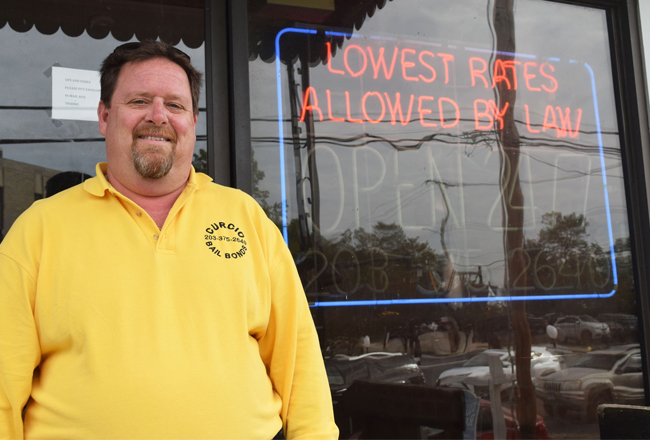Second-generation bail bondsman Vinny Curcio helps those stuck behind bars
It”™s safe to assume that most people give little thought to the bail bond process until circumstances place them in need of something resembling a get-out-of-jail card. And that”™s where Vinny Curcio comes in.
Curcio is a second-generation bail bondsman, running the family-owned Curcio Bail Bonds from an office located across the street from the Bridgeport Police Department”™s headquarters. Curcio”™s business covers the entire state and he is part of a network that enables him to post a bail bond in all 50 states.

How does the process work? “If you”™re arrested at night for say, a simple assault, they put a $1,000 bond on you,” Curcio explained. “You don”™t have $1,000 on you, obviously, so you pay us a fee of $100 and we would post the $1,000 with the police department or the courts for you. As long as you go to court, we get the $1,000 back and retain the $100 as a fee.”
However, Curcio doesn”™t take all calls for help from individuals eager to get out of police custody. “We get probably 50 to 100 phone calls a week, of which maybe we will post 10,” he continued. “We do take into consideration whether or not you are going to go to court, how long you lived in the area, what your risk of not going to court is. As long as we feel you will appear on all of your court dates, we will take the risk.”
And it is a risk, with roughly one out of 10 bailed-out individuals failing to make their court dates. Curcio admitted the majority of those no-shows are honest mistakes, but the ones who intentionally miss their court appearances leave him with the choice of forfeiting the bond to the state or calling on one of his five bail enforcement agents to track down the bond-jumper and haul him back into custody.
“For the most part, we find the fugitive and remand him back to custody,” he added.
The company was started by Curcio”™s father, Vincent L. Curcio Sr., in 1956. Curcio”™s mother and sister joined later, with Vinny Curcio coming on board during his junior year of high school.
“A couple years after I graduated from high school, I took over,” he recalled. “My father was ready to retire and he slid his beeper across the table and said, ”˜I”™m done, call me if you have a problem.”™ And he came back three times to fix things. For him, they were simple things. For me as a 20-year-old kid, they were really serious.”
As a 24/7 service, Curcio and his team of four bail agents never take a day off. “We get calls during the holidays all the time,” Curcio said. “Even on Christmas Day. We”™ve done well all year long, so we don”™t feel we should leave them in jail on Christmas.”
Curcio noted that if there is a downside to running a bail bonds business, it would be dealing with state regulatory control of his industry.
“Today, it is very regulated and the state is very difficult to deal with,” he said. “And they are doing things to this business that are not that good. They”™ve regulated it to the point that they”™ve eliminated all small bail. The heart of this business was anything from a $500 to a $1,000 bond, but it”™s not like this anymore. Bonds today are larger. And they”™ve released people without any repercussions. Usually, they”™ll get arrested, go to court and get released at the courthouse. It”™s done a lot of damage to the business and it”™s also damaged the public because the people who are not going to court have no reason to go to court. They”™re signed off on their own recognizance and there is no need for them to do what they”™re supposed to. And most people do what they”™re supposed to when they have somebody over their heads.”
Whether there will be a third generation of Curcios running the business remains to be seen. Curcio”™s 23- and 22-year-old daughters have expressed interest, but have yet to take the necessary licensing classes needed to operate as a bail bondsman. And if Curcio”™s worst-case scenario of the state over regulating the industry to the point where it can no longer function, he does have a second career with his wife Denise in a Stratford-based real estate group within the William Raveis network.
“My wife has six agents who work for her,” he said. “If there”™s something she can”™t handle, I pick up the slack. But she is the brains of the business.”